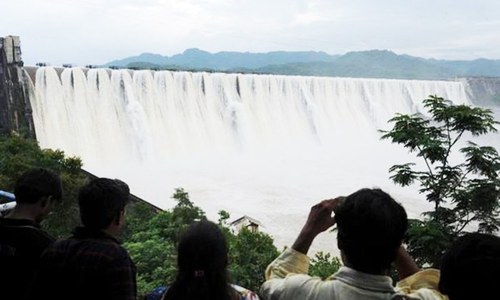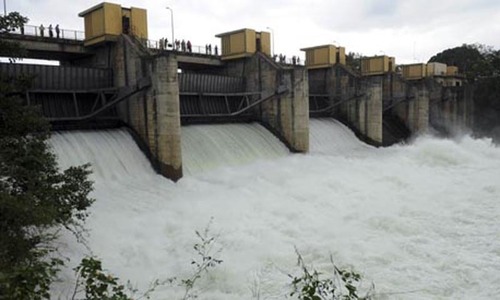ISLAMABAD: Pakistan is facing about $29 billion in economic losses every year on account of unutilised flow of river waters into the sea due to limited water storage capacity.
“We and our coming generations would die of hunger if we do not build dams,” Rao Irshad Ali Khan, Member Punjab of the Indus River System Authority (Irsa), told the Senate Standing Committee on Water Resources on Tuesday. The meeting was presided over by Senator Mohammad Yousuf Badini.
The committee ordered completion of the process to award by June the contract for establishment of the telemetry system for accurate reporting of water flows and immediate appointment of Irsa’s member from Balochistan.
At the outset, the senators expressed displeasure over the absence of Minister for Water Resources Faisal Vawda from the meeting. Mr Badini said it was unfortunate that the “Faisal Vawda bootwala” had enough time to appear in talk shows and make mockery of state institutions with show of boots but did not attend committee meetings about his ministry.
Coming generations will die of hunger if dams not built, Senate panel warned
Irshad Khan told the committee that one million acre feet (MAF) water on average irrigated four million acres of land and the economic value of 1MAF water was estimated at $1bn. He said that about 29MAF water on average was going downstream Kotri — the last structure on the Indus system for water regulation — and falling into the Arabian Sea every year.
“We can save this water by increasing storage capacity and bring virgin land under cultivation, but unfortunately this has been going down the drain since 1976,” he said, adding: “Our population is increasing day by day and if we keep losing, the day is not far off when people would be on roads due to hunger. We will die of hunger. Our future generations will die of hunger without additional dams.”
Mr Khan said Mangla and Tarbela dams had storage capacity of 7.3MAF and 6MAF, respectively, and even the storage of Mangla dam had dropped from 9.7MAF.
Responding to a question about Sindh-Punjab dispute over interpretation of the water accord in times of water shortages, he said the attorney general for Pakistan (AGP) had presented a report on legal interpretation of water distribution to the Council of Common Interests at its meeting on Dec 23. However, he said the issue was so sensitive that the prime minister had constituted a committee led by the AGP and comprising advocates general for the four provinces and technical experts to submit recommendations on the subject for a way forward.
The committee was informed that the telemetry system to check water flows was a national project currently under an implementation stage, but the contract given to a firm for installation of telemetry gauges was withdrawn after the Punjab government reported its unsatisfactory performance. Therefore, the water regulator has now decided to go for re-bidding.
Yousuf Badini expressed displeasure over the selection and withdrawal process for a national project and observed that another province could come up with reservations over the next contractor. He expressed surprise that the said contractor was still working in Punjab and the provincial government had not blacklisted it for ‘unsatisfactory performance’. It appeared, he said, that beneficiaries of the inaccurate recording of water flows were creating hurdles.
The committee directed that the contractor be appointed by June this year.
A senior official of the Punjab irrigation department said the province had no objection to the telemetry system and in fact the provincial government had always supported and advocated for the project. He said Punjab would even encourage deputation of independent inspectors at all discharge points of the irrigation system until the telemetry system was made operational.
The committee was informed that an Irsa inspection team had visited various places in July last year and noted a huge difference in reported and actual flows. For example, the team found that Sindh irrigation officials were misreporting 5,273 cusecs at Pat Feeder, 21,000 cusecs on downstream and 6,000 cusecs at Nara Canal.
This was challenged by a senior official of the Sindh irrigation department that the flow at Nara Canal was reported about 21,000 cusecs, but a study showed the maximum capacity of the canal was only 14,000 cusecs. He said Sindh had serious reservations over the redesigning of Greater Thal Canal (GTC) because any development in the upstream of the Indus system would affect the downstream irrigation. The official said GTC’s capacity was being enhanced from 2,000 cusecs allowed in the water accord to 5,500 cusecs because Punjab wanted to draw higher than allowed share.
Punjab officials said the GTC expansion was an old project and Irsa had also issued a no-objection certificate in the past. They said every province had the right to draw its water share from where it found feasible.
Water Resources Secretary Mohammad Ashraf endorsed Punjab’s viewpoint, saying the province had a right to use its water share from any point and Sindh’s reservations were unjustified. He told the committee that a technical adviser for the telemetry system would be hired within 180 days and the entire project was expected to be operational in about two years.
The committee recommended that until this process is completed, water inspectors should be deputed at distribution points to keep a check on any irregularities that may occur.
Published in Dawn, January 17th, 2020
















































